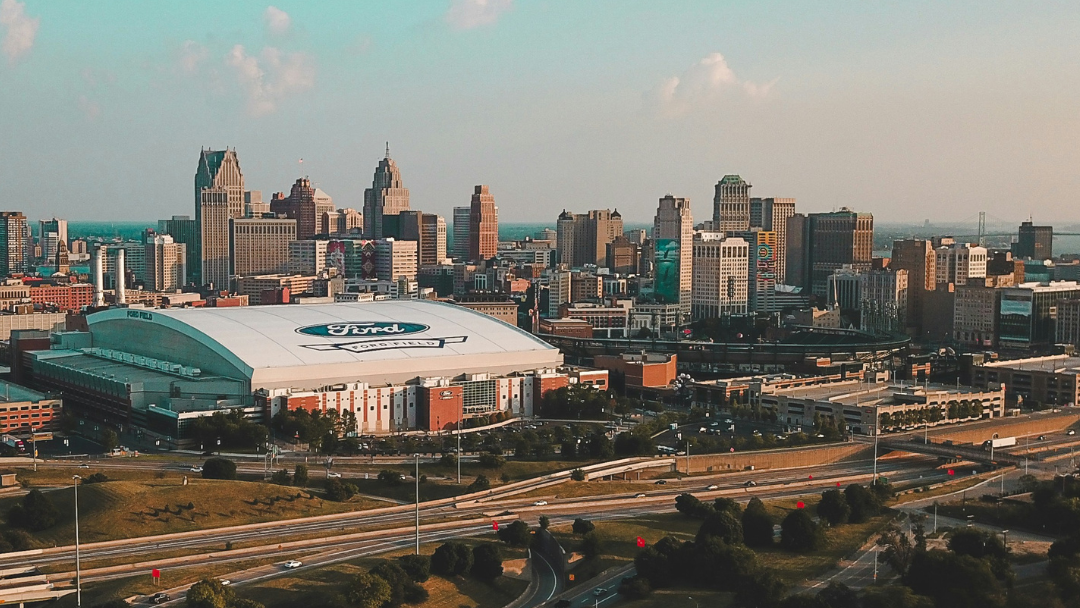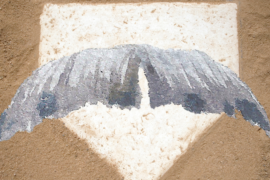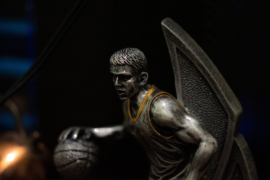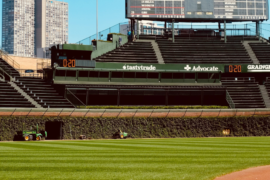The Detroit Lions lost a divisional playoff game last night. It wasn’t an occasion for grief. I woke up today and my wife said I still smelled like booze, even after I’d brushed my teeth and swished with mouthwash.
Where were we last night? A brick colonial on Outer Drive Court in my brother-in-law’s newly-remodeled basement, the game on the big screen. I invited Nick Mansfield to the party even though it was risky. He came to the party last year when we squandered a 17-point lead against the 49ers. He hadn’t been to the previous two playoff games we’d won, so we all imagined he may’ve jinxed it, that his presence may’ve cost us the win.
Football is known as a violent, physical game, and this is accurate, but Lions football has been a primarily ethereal matter dating back to 1957, which is to say we’re cursed.
I have to remind myself that this piece is about grief, not football. Personal grief, national grief, overlapping with football here and there, but this piece is not about football.
Where was I? I was awake in the upper half-story of our little bungalow in Dearborn, the hometown of the fascist tinker Henry Ford whose great granddaughter, Sheila Ford Hamp, owns the Lions. It was 10am, and I was likely still legally drunk, not just hungover; I’ve been merely hungover, and it didn’t feel like that.
Sarah said it smelled like a gin mill up here but to get up, get dressed, and brush my goddamn teeth because we needed to go shopping for the week.
We were going to Westborn Market, as always. Westborn was the last place we saw Mansfield’s father alive. That day, Big Dave Mansfield had been sitting in the parking lot with his Gordon Setter while Mansfield’s mother shopped. Hot summer daylight refracting from the asphalt and I heard somebody whistle at me. I turned around and there was Big Dave. Nothing special in the exchange, just chit chat about dogs and groceries and weather. That was it.
I end up thinking of him every time I go there now. I wasn’t particularly close with him, but we’d shoot pool together at a bar in Dearborn Heights occasionally, and when he came out to hear me play Irish music with Nick at the local Irish bar, he’d ask for “A Pirate Looks at 40” by Jimmy Buffett and “Dead Flowers” by the Rolling Stones, and then when we’d get done with our set, he’d tell me, “Good set, John. You were the best one in your row.”
Dave was an industrial painter by trade, and Nick is an industrial firefighter on Zug Island in Detroit, a false island carved from a peninsula of land in the Detroit River by Henry Ford to allow easier shipping access to his Rouge complex in Dearborn. There’s a defunct steel mill over there and a bunch of coke heaps, decommissioned blast furnaces, and gantry cranes. Sometimes to describe a place is to romanticize a place, but I don’t mean to do this with Zug.
Westborn was not only the last place I saw Big Dave, but it was also where I was when I got the call that he had died. It was Nick at 10am on a Sunday. An odd call to get, one where you understand something is terribly wrong. He never calls on a Sunday morning. Bad News. Big Dave is dead. They don’t know why or how.
I sat down on a steel bench in front of the store and wept. I told Nick that the grief would come and go, that he’d go for several hours feeling composed and a random trigger would just wreck him. Losing a parent is a different thing, I told him.
Last night, the Lions were down 10 at halftime and Nick asked me to step outside, said he wanted to show me something. I followed him to his car. He had a rack of pool balls in a zippered case. He told me they were the rack that graced his father’s table and that Big Dave would’ve wanted me to have them. I told Mansfield I’d set them up on the eight-foot Bailey table in my basement, and I’d have him over soon to shoot a game of straight pool and tell stories about Big Dave. It would be a nice tribute to his father.
Stories and movies abound where a father dies and then their beloved sports team goes on a run and the family interprets it as a tribute to the deceased patriarch. Big Dave didn’t even like the Lions. Having grown up in Reno, Nevada, he was actually a 49ers fan.
The Lions lost 45-31 last night. I went to the grocery store in Sarah’s car, drunk and completely out of it. The Lions banner above the entranceway was sad. I walked listlessly down the wine aisle. Nothing new. They never carry anything new, same old whites, same old reds, same old Lions. Fill a bathtub with whiskey to expiate the curse of Bobby Layne and it’s still the same damn thing.
There was an arctic weather snap coming the following day. I ordered a small coffee over at the bakery, then found Sarah gazing into the steamed plastic domes of the rotisserie chickens, trying to identify the best one. It’s hard to see them when they steam up like that. I told her she may as well just grab one, they’re all the same. We gathered up what we thought we needed to hunker down and get through the snap without having to leave the house: a rotisserie chicken; an assortment of peppers, mushrooms, and tofu for a veggie stir fry; two bottles of New Zealand Sauvignon Blanc; two bottles of Chianti; some sliced turkey and bread for sandwiches.
I remembered how someone once asked William Carlos Williams if a grocery list could be a poem, and he said yes. Lists and poems are mostly lineated though, and you’ll notice my list uses semi-colons for the purpose of grouping like items and allowing a reader to pause between items and visualize them before being inundated with further items. There are cadences to poems and grocery lists, to snap counts and sad bastard days.
There’s nothing analogous to a semi-colon in football. A pause before a snap count, the end of a quarter, the end of the chains signifying the line to gain and the start of a new series. No, it’s overwrought. I’ve felt stupider watching this violent game so much in recent years. It used to be funny, watching them on Sundays, the way they’d find a way to hook you in and then lose in a manner you’d never heard of. It was never about football.
As we opened the trunk of Sarah’s Ford Escape, we saw the case with the pool balls and she asked what they were. I told her they were a rack of pool balls that had once belonged to Big Dave. She pointed toward a parking spot next to the cart return and remembered how that was the last place we’d seen him. I started sobbing and she gave me a big hug, holding me tight in that frigid lot.
When Dave died last summer, Mansfield asked me to say a few words at the celebration of life. The beginning of it went like this:
I first met Dave Mansfield 15 years ago at a birthday party for Nick, and he told me a story about a WWF wrestling event I’ll always remember. Dave had just moved to town from Reno, and Cindy had scored tickets to a WWF showdown at Joe Louis Arena. According to Dave, Jimmy Hart, the Mouth of the South, was about to whack Hulk Hogan in the neck with a chair, when Dave rocketed a full beer at the back of Jimmy Hart’s head. It was a good shot, and the beer exploded on him and ruined his sequined jacket. Moments later two Detroit cops grab Dave out of his seat, escort him into a tunnel somewhere in the recesses of the storied arena and are tapping their nightsticks against their palms in a menacing way, telling Dave just what they’re gonna do to him. Dave Mansfield was a tough sonuvabitch, but at this point he’s starting to feel a little squeamish. He’s new to town and wondering if he made a mistake in leaving his beloved Reno, Nevada for Detroit. On cue though, just as it’s about to get ugly, Cindy strolls in with the general manager of the Joe, and the GM personally escorts she and Dave back to their seats. Dave ended the story by saying, “That’s my Cindy, man. She always comes through.” I was laughing during most of it, but by the end, I realized it was a story about true love and loyalty. All of us who know Dave, know this about him: he was loyal and loving, if you had him in your corner, you were truly blessed.
And that’s what really hit me when we lost Dave last month. He was one of the people who was in my corner. He loved coming out and seeing Nick and I play music together, and he’d always bust my chops. When we finished a set, he’d call me over and say, “Good set, John, you were the best one in your row.” We’d play “Dead Flowers” and “A Pirate Looks at Forty” and kick them out to him. He was my best friend’s dad, but I felt like we were friends too. I’d toss it back his way. Dave was big on taking Facebook quizzes, and one he took more than a few times was, “What kind of dog are you based upon your personality?” When the result came back chihuahua multiple times, Dave posted it with the caption, “You gotta be kidding me.” Then he retook the quiz until it came back “Rottweiler.” But when I dedicated to those songs to him at our shows, I’d make sure everyone at the bar knew to call him the chihuahua. “Did anybody ever tell you you’re really funny, John?” he’d ask me.
It was the best I could do, and it felt good to get a Jimmy Hart reference in. I kept thinking of Dave that day and going back to the Lions’ loss. These incommensurate, unrelated events. Both had such finality to them. There’s always next year, but of course that wasn’t true for Dave. Our coordinators were gone. Gone were the weekly gatherings with family members to watch the games.
We dropped the groceries at the house before heading downtown to eat brunch at a French restaurant. Sarah said our city existed regardless of the playoff status of Dan Campbell’s stupid football team, which I knew was correct.
It was grey down there and quiet. I remember, as a boy, learning that grey could be spelled either “gray” or “grey.” I intuitively took to spelling it “grey,” deciding decades later that it was far better and more mimetic of the actual sky above West Detroit where I grew up. “Macadam, gun-grey as the tunny’s belt,” as the poet Hart Crane would have it.
It was a beautiful little spot she took me to. High plate glass windows with gold leaf lettering, oak frames around upper-quarter panes with Venetian blinds. An oak bar with marble stools with wire legs and backs.
But there was a Sartrean pall over the place, a Fontesean pall over the place. Last night’s revelers took up all the quaint little tables, and there were small skillets on the bar top with crusted breakfast potatoes and eviscerated quiche stuck to them. Sarah speculated that the stuff had been left there to discourage new diners at the bar. I agreed; it must’ve been a hideous, if profitable weekend for the service employees down here.
We sat next to a guy in chinos and a Honolulu blue windbreaker with circles under his eyes. A real douchebag business type. One of the boys who had gobbled up a thousand-dollar ticket, failed to get loud enough during Washington third downs, then beat his brains in with Scotch and blow and strippers after the team lost. We didn’t want to talk to him. We moved a couple stools down, in front of one of the disgusting skillets, to avoid hearing anything about his thoughts on the game or the world.
Last night Jared Goff got his bell rung after throwing an interception on what should have been called a late hit. He had to go into the infamous blue tent to get screened for concussion protocol. In the meantime, journeyman Teddy Bridgewater, fresh off of unretiring after coaching Miami Northwestern High School to a Florida state championship, led us on a three-play touchdown drive that included a three-yard completion. I remembered this as the bartender set a mimosa before me.
I got out my phone and posted, “A day of mourning on an eve of mourning, but can we take a minute to appreciate Teddy Bridgewater? Absolute legend!”
I found myself crying again. I downed the mimosa and managed to compose myself before the quiche and omelette came. I ordered a glass of Syrah and drank it while we ate the delicious food and Sarah talked about the collection of Djuna Barnes stories she was reading. She thought I’d like the one called “No Man’s Mare” whose final scene involved a rogue horse carrying a corpse into the sea. “That sounds like something I’d like,” I agreed.
After brunch we went to see a movie at the art institute about American jazz and the CIA-backed Coup d’Etat against Patrice Lumumba. Tomorrow we’ll inaugurate a man who represents everything I detest about this country but can’t help participating in. The interpellation is the kompromat, I realize.
We all have various mechanisms for ennobling our habits. I usually turn to Roland Barthes when I want to transform the quotidian act of watching sports into allegory: There are people who think that [football] is an ignoble sport. [Football] is not a sport, it is a spectacle, and it is no more ignoble to attend a [footballed] performance of Suffering than a performance of the sorrows of Arnolphe or Andromaque. But it feels a bit disingenuous today. Barthes is writing about wrestling, and this isn’t about football.
CAL FREEMAN (he/him) is the author of the books Fight Songs and Poolside at the Dearborn Inn. His chapbook, Yelping the Tegmine, has just been released. His writing can be found in many publications, most recently The Glacier, Potomac Review, Panoply, and North American Review. His next book, The Weather of Our Names, is due out this year from Cornerstone Press.
Like what you’re reading?Get new stories, sports musings, or book reviews sent to your inbox. Drop your email below to start >>>
NEW book release AWRY by duncan b. barlow. Order the book of stories of which Brian Evenson calls “meticulous and precise, painful and surprising.”
GET THE BOOK



